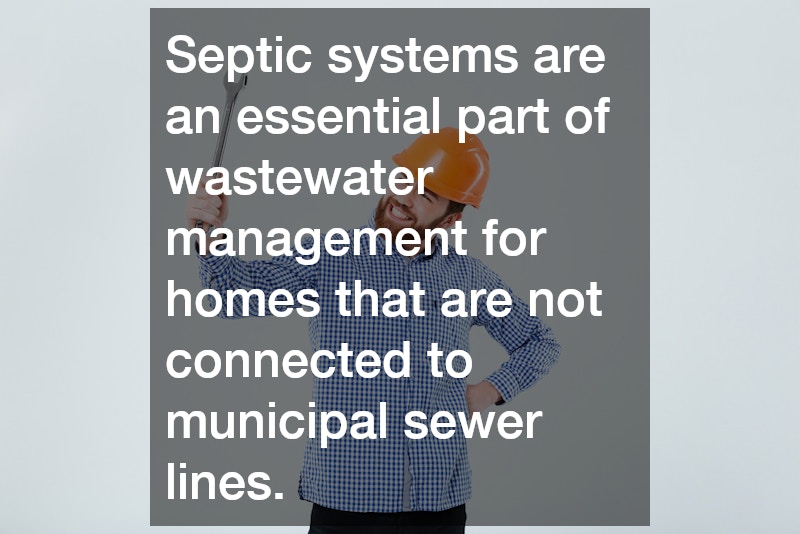Septic systems are an essential part of wastewater management for homes that are not connected to municipal sewer lines. These systems treat and dispose of household wastewater directly on the property, making them crucial for rural and suburban areas. A typical septic system consists of a septic tank, distribution box, and a drainage field, which work together to process sewage. The septic tank stores solids, while the liquid effluent is transported to the drainage field for further treatment. Understanding the fundamentals of septic systems helps homeowners make informed decisions about their installation and maintenance.
The proper functioning of a septic system requires regular maintenance and monitoring. Homeowners need to be aware of the demands a septic system places on their property and lifestyle. Without timely inspections and cleaning, a septic system can lead to unpleasant issues, such as backups and foul odors. Engaging a local septic cleaning company is crucial to ensuring your system operates optimally. These professionals provide essential services to prevent costly repairs and extend the life of the septic system.
Septic systems come with certain advantages and disadvantages. It is vital for homeowners to weigh these pros and cons to determine if a septic system is the best solution for their needs. Factors to consider include the geographic location, household size, budget, and environmental impact. Through careful consideration, individuals can improve wastewater management while minimizing potential risks. In the following sections, we will explore the specific pros and cons of using a septic system.
Pros of Having a Septic System
Septic systems offer several benefits, particularly for homeowners in rural areas without access to municipal sewer services. One of the main advantages is the independence from public sewer utilities, which can reduce monthly utility costs. This self-sufficiency is particularly appealing to those living in remote areas where connecting to a city sewer line is not feasible. Additionally, a septic system eliminates the need to pay sewer fees, which can vary depending on location and usage. Furthermore, having a septic system can increase property value due to its functional wastewater treatment capability.
Another significant advantage of septic systems is their environmental friendliness. Because they treat water on-site, they minimize the pollution and contamination risks associated with municipal sewer systems. Instead of relying on large-scale wastewater treatment plants, septic systems use natural processes to decompose organic waste. This method reduces the environmental footprint by conserving water and preventing harmful chemicals from entering local water bodies. Homeowners who prioritize sustainable living may find septic systems to be an attractive option for managing household waste responsibly.
Septic systems are typically durable and have a long operational lifespan when properly maintained. A regularly serviced system can function efficiently for decades, providing a reliable solution for waste management. Investing in routine cleaning and inspections by a local septic cleaning company can prevent issues like clogs and system failures. Regular maintenance enhances the system’s performance, ensuring safe and efficient wastewater treatment. By taking preventive measures, homeowners can enjoy the benefits of their septic system without frequent disturbances.
Cons of Having a Septic System
Despite the advantages, septic systems also present certain challenges and drawbacks. Initial installation costs can be significant, making it a considerable investment for homeowners. This expense includes not only the tank and components but also professional installation services. Depending on the soil type and required system design, costs can vary greatly. While these systems provide long-term savings, the upfront expense may be daunting for some families.
Maintenance requirements are another potential downside of owning a septic system. Unlike municipal sewer services, septic systems require homeowners to take responsibility for regular upkeep. This includes monitoring water usage, scheduling periodic inspections, and engaging a local septic cleaning company for routine tank pumping. Failure to maintain the system properly can result in expensive repairs and environmental risks. Homeowners must remain vigilant and proactive in their approach to maintain the system’s effectiveness.
Septic systems also have limitations based on geographic and environmental factors. Certain soil conditions, high water tables, or proximity to water bodies can hinder system functionality. In such cases, alternative waste management solutions may be necessary. Additionally, improper use or negligence can lead to soil and groundwater contamination. Therefore, it is crucial for potential septic system owners to assess their property’s suitability before installation and to adhere to best practices for system care.
Choosing whether to install a septic system is a decision that requires careful consideration of its pros and cons. While they offer independence from municipal services and environmental benefits, the financial and maintenance obligations should not be overlooked. A comprehensive understanding of these systems, along with regular servicing by a local septic cleaning company, can greatly enhance their longevity and performance. Homeowners need to ensure they are equipped to manage the demands of a septic system effectively.
Ultimately, the suitability of a septic system depends on various factors, such as location, budget, and environmental priorities. By weighing the benefits against the potential challenges, homeowners can make informed choices that align with their needs and values. If you are considering a septic system, consulting with professionals and gathering insights from those with experience can be immensely beneficial.
In summary, a septic system can be an efficient and sustainable method for wastewater management. With proper planning, maintenance, and the support of a local septic cleaning company, it can serve as a reliable solution for many households. As our understanding of sustainable practices grows, septic systems may continue to evolve, becoming an integral part of environmentally conscious homeownership.

